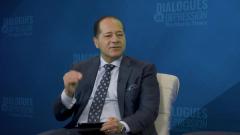
Anhedonia and Cognitive Dysfunction: Glutamate Modulation's Impact
Experts discuss the impact of targeting glutamate receptors, highlighting its positive effects for patients with anhedonia.
Episodes in this series

Transcript
Gus Alva, MD, DFAPA: Well, I’m glad you touched on that right now because our next point is really regarding rapid-acting therapies for major depressive disorder [MDD]. But I’d like you guys to discuss now some of the key characteristics and defining features including modalities like an NMDA [N-methyl-D-aspartate] or AMPA [α-amino-3-hydroxy-5-methyl-4-isoxazole propionic acid] receptors or GABA [γ-aminobutyric acid] modulators. If you wouldn’t mind taking a stab at that right now because you just alluded to that right now, Greg.
Greg Mattingly, MD: I would kind of think about, first of all, if I have somebody who’s in urgent need of help. I’ve been a part of trials where we say, listen, for somebody who needs help, maybe today, I’m going to measure outcome with one of these glutamate medicines for people who have depression with suicidal thinking. Within 4 hours we saw they were already starting to have symptomatic improvement. The glutamate medicines are the only medicines that have an indication for major depression with suicidal ideation. We were also part of the postpartum trials where women struggling with bad postpartum depression, hormone-induced, but now it’s stuck in their brain, it’s stuck in their nervous system. We were able to see women were getting better within 24 hours, [and a] sustained effect over 2 weeks that lasted when you stopped the medicine. Then, finally, with our oral glutamate medicine, it got breakthrough status because we saw people getting better, having response, having remission within 1 to 2 weeks, not the typical 1 to 2 months.
Erin Crown, MHS, PA-C: And remission has to be our goal, right? I love that you just brought that into the conversation because I don’t think we talk enough about remission. We’re happy when people are no longer calling us with their problems, their concerns, I need a sooner appointment and all of that. We’re happy when they’re good enough, right? I think that we have to stop practicing psychiatry that way. I don’t think any of the 4 of us practice it that way, by the way, but people do still do that when people are coming back in follow-up and they’ll say, "Oh, you know, I’m doing better. I’m getting out of bed. My energy’s improved." Great, we stop there? Why? No, we should not be doing that. And when we think about anhedonia as it ties to even not just quality of life, but then also it’s tied to disability as well. We need to be thinking about this because major depressive disorder is the No. 1 cause of disability worldwide. Its prevalence is 16% worldwide and only about 50% get an adequate response, and one-third relapse.
Craig Chepke, MD, DFAPA: Something I hear you say all the time, Greg, is that the 2 symptoms that correlate most with poor functional outcomes in MDD are anhedonia and cognitive dysfunction. And the 2 symptoms that are the most commonly residual with our traditional antidepressants are anhedonia and cognitive dysfunction. So maybe these new MOAs [mechanisms of action] with the glutamatergic agents, and I would say probably do, have a much greater effect on those particular symptoms that can cause the most disability and dysfunction for our patients.
Erin Crown, MHS, PA-C: We have some studies that say just that.
Greg Mattingly, MD: I’ll flip it around. So we talk about rapid onset. That’s really going to be a benefit of these. We know that. I think that’s pretty proven. They’ve gotten breakthrough status. Are there certain symptom subtypes that would make you want to reach in and modulate glutamate or that GABA-glutamate interface? What would those symptoms subtypes be? I think [Craig] mentioned one, right?
Craig Chepke, MD, DFAPA: Exactly, anhedonia and cognitive dysfunction would be my top 2.
Greg Mattingly, MD: Explain to the audience what anhedonia is because I’ve never had a patient in 30 years say, “Dr Mattingly, I think I have anhedonia.”
Craig Chepke, MD, DFAPA: That’s a great point, because also when I talk with colleagues, too, they’ve heard the word anhedonia, but it often doesn’t resonate what it is, but it’s that person who just doesn’t feel, that nothing feels good, and it’s like the couch potato type of patient, that they just don’t want to do anything. Everything feels like too much effort. There are different types of anhedonia. There’s anticipatory anhedonia. They don’t believe that anything is going to feel good if they do it, and then consummatory anhedonia, that even once they do something that normally they would have felt pleasure from, they don’t feel any pleasure from it, and that becomes a vicious cycle. Once they don’t feel the pleasure, why would they go on and want to do it again, even if they used to enjoy it? It can be a vicious spiral that leads them to not want to engage in anything, and it’s often the patient I find in practice who is often very vague with their symptom presentation when they’re taking history, like, “I don’t know, I just don’t want to do anything.” Well, what kind of thing? So it’s just nothing. “I don’t want to do anything,” and almost like a blank slate.
Gus Alva, MD, DFAPA: And, ultimately, it both sounded a happiness, self-esteem, and those particular themes of, again, feeling energized and calm at the same time, right?
Transcript was AI-generated and edited for clarity.
Newsletter
Receive trusted psychiatric news, expert analysis, and clinical insights — subscribe today to support your practice and your patients.


















